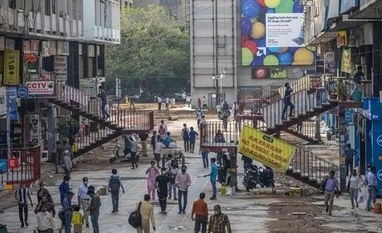The Indian economy will suffer “lasting damage” from the Covid-19 crisis, after a strong rebound in FY22, with its growth slowing to about 6.5 per cent a year over FY23 to FY26, according to Fitch Ratings.
This would be due to a combination of supply-side scarring and demand-side constraints such as the weak state of the financial sector that will keep India’s GDP well below its pre-pandemic path, a note by the ratings agency said.
The Covid-19 induced recession in India has been among the most severe in the world due to a stringent lockdown and limited direct fiscal support. “The economy is now in a recovery phase that will be further supported by the rollout of vaccines in the next months and we expect GDP to expand by 11 per cent in FY22 after falling by 9.4 per cent in FY21,” it said.
India is projected to witness its first GDP contraction of 7.7 per cent in decades, according to government’s first advance estimates. The Reserve Bank of India has projected the economy to shrink by 7.5 per cent in the current financial year.
Even as the growth will be supported by the rollout of effective vaccines, the level of GDP will remain well below its pre-pandemic path even after the health crisis has passed, the note said.
“The current recession will leave lasting scars,” it said. The crisis will mean lower investment growth for some years, and slower capital accumulation will be the main source of weaker supply-side growth, according to the ratings agency.
The ratings agency called lower investments as the “main potential growth dampener”. The pandemic is set to weigh on capital expenditure for some years, feeding directly into a slower pace of capital deepening, it said. Fitch Ratings projects a 14 per cent drop in investment in FY21, which would increase by 18% in FY22 due to favourable base effects and easing of the heath crisis. However, investment growth is expected to slow to around 6% a year in the subsequent years, it said.
Investment demand will be dragged down by the need to repair balance sheets and shutting of firms. Companies have received limited direct fiscal support, with the overall fiscal stance eased by only a little. “Constrained credit supply amid a fragile financial system is another headwind to investment. Banks entered the crisis already fragile, hampered by a misallocation of credit,” the ratings agency said.
Renewed deterioration of banks’ asset quality
The government’s policy support and debt forbearance have kept many companies afloat and limited the credit loss provisions in banks’ books. Policy support, including government-backed credit guarantees, will gradually unwind when economic
conditions allow, and translate into a renewed deterioration of banks’ assets quality. “...this will put the brakes on lending for years to come as banks work to maintain or restore capital buffers,” the ratings agency said..
The extent of damage to the banking sector should become more apparent in mid-2021, when the debt restructuring scheme expires, it said.
Vaccine optimism
In a separate note, Barclays India in a note, said the distribution of an effective vaccine should allow the few remaining restrictions placed to be eased. Considering a reasonably good pace of distribution, the final mile unlocking of the economy will begin soon, which should drive the recovery through the first half of the next financial year.
The research report projects a ‘solid recovery’ in FY22 of 8.5 per cent. “The economic recovery is steadily broadening, and activity is back at or above pre-COVID levels in many sectors,” it said.
However, the note by Fitch Ratings said it’s likely that the vaccine rollout over the next 12
months will not reach the majority of the population given the huge logistical and distribution challenges. “The rollout of the vaccine will require unprecedented cooperation among manufacturers, governments, cargo operators and ground workers,” it said.
This may lead to regional shutdowns in the next few months, it said.
Unlock 30+ premium stories daily hand-picked by our editors, across devices on browser and app.
Pick your 5 favourite companies, get a daily email with all news updates on them.
Full access to our intuitive epaper - clip, save, share articles from any device; newspaper archives from 2006.
Preferential invites to Business Standard events.
Curated newsletters on markets, personal finance, policy & politics, start-ups, technology, and more.
)